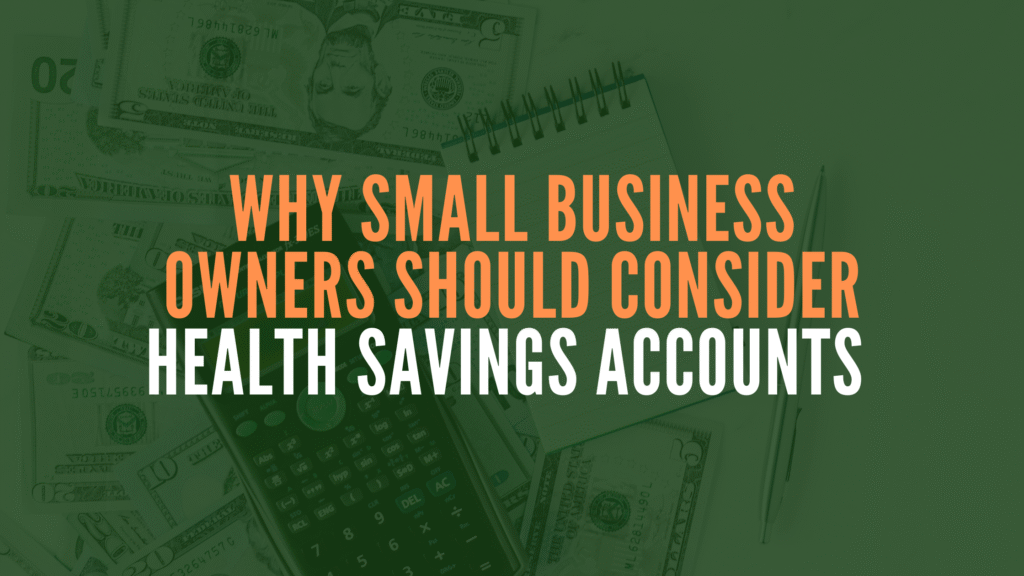As a small business owner, you’re always looking for ways to save money, whether it’s on operations, taxes, or benefits for your employees. One option that has grown in popularity in recent years and could be a great fit for your business is the Health Savings Account (HSA).
You may have heard of HSAs before, but perhaps you’ve never fully understood how they work or how they can benefit you and your business. Well, here’s the scoop: HSAs aren’t just for individuals, they’re a tool that can significantly benefit small business owners like yourself. Let’s break down why HSAs are something worth considering for both your personal and business needs.
What is an HSA?
An HSA is a tax-advantaged account that allows you to save money for medical expenses. To open one, you need to have a high-deductible health insurance plan. That’s the only catch. Once you’re set up, you can start contributing money to the HSA, and that money grows tax-free meaning no taxes on the contributions, the earnings, or the withdrawals when used for qualified medical expenses.
Tax Benefits that Can’t Be Beat
One of the most attractive features of an HSA is the tax advantages it offers. Contributions are deductible, meaning you can reduce your taxable income by putting money into the account. Earnings grow tax-free, and when you use the funds for qualified medical expenses, you don’t have to pay any taxes at all.
In fact, you can contribute up to $3,850 as an individual or $7,750 as a family in 2023. And if you’re 55 or older, there’s an extra $1,000 catch-up contribution, allowing you to put even more money away for future medical costs. This is particularly valuable as medical expenses can add up, and having a tax-free way to pay for them can save you significantly in the long run.
HSAs: More Than Just Medical Savings
HSAs can also be viewed as a long-term investment tool. If you don’t use the funds for medical expenses, the balance grows just like an IRA. Once you reach the age of 65 (and become eligible for Medicare), you can withdraw the funds for anything, not just medical expenses, though you will pay regular income tax on those withdrawals. This makes HSAs a unique dual-purpose tool: you can use it for medical costs now or save it for the future.
How Does the HSA Work for Small Business Owners?
If you’re a small business owner, an HSA can be an incredible asset for you and your employees. You’ll need a high-deductible health plan, but once you have that, you can offer HSAs to your employees, which could make your benefits package even more attractive without significantly increasing your business expenses.
The best part is that HSAs aren’t limited to employees, you can also take advantage of them as the business owner. In fact, HSAs are a way for you to keep healthcare costs manageable while also building a financial cushion for your medical needs.
Things to Keep in Mind:
- Eligibility: To contribute to an HSA, you must have a high-deductible health insurance plan. So, if you have a regular health plan, you might not qualify.
- FSA Restrictions: You cannot contribute to both an HSA and a general-purpose healthcare Flexible Spending Account (FSA) in the same year, so if you have an FSA, you’ll need to make a choice between the two.
- Investment Options: HSAs are like IRAs in that they can be used to invest in stocks, bonds, and mutual funds. Some banks or brokers may limit your choices to more conservative options, so be sure to check with the provider about your investment choices.
If you’re looking for a tax-friendly way to manage your healthcare expenses whether for you, your family, or your employees, the HSA is an option that’s definitely worth considering. It’s a flexible, powerful tool that provides financial benefits today and in the future.
Given the tax advantages and the potential for long-term growth, setting up an HSA could be one of the best decisions you make as a small business owner. Whether you’re aiming to save money on medical expenses now or building a nest egg for future healthcare costs, the HSA could be the perfect fit for your business.

